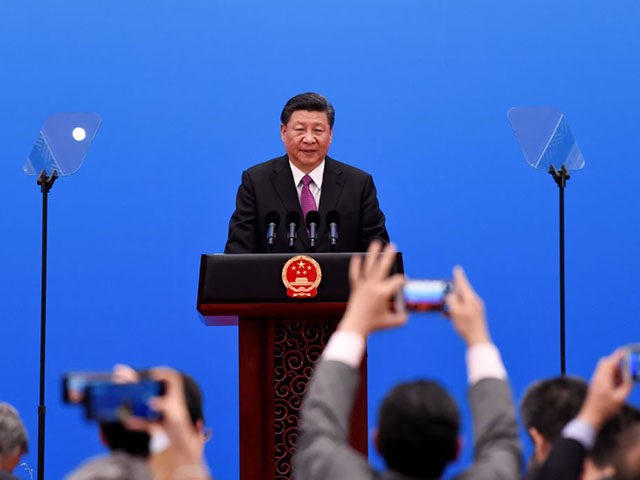Analysis of the historic peace deal between Israel and the United Arab Emirates (UAE) tends to focus on Iran and Turkey as the big losers. They were certainly the loudest complainers.
A more quietly disappointed loser could be China, which has major ambitions for the Middle East under its Belt and Road Initiative (BRI).
The big risk for China is that the UAE could demonstrate Israel is a better business partner for infrastructure development, with few strings attached. The UAE is currently a BRI partner, with some $3.4 billion in deals under the initiative, and Israel has a piece of the action, too. China went on the record welcoming the accord with Israel as a means of increasing “regional peace and stability,” but the shifting geopolitical landscape in the Middle East could lead to reduced demand for Chinese industry, and the Chinese Communist Party leverage that comes with it.
Beijing has some very heavy bets on the most unstable and un-peaceful actors in the Middle East. China is looking for a big piece of Syrian postwar reconstruction, it is working on a major partnership with Iran, and it is looking to pull Turkey more firmly into its orbit.
Every unhappy party listed in analyses of the Israel-UAE deal is a space on the Middle Eastern game table where China has a big stack of chips. A typical example from Thomas Friedman at the New York Times called the deal an “earthquake” and listed the “big geopolitical losers” as “Iran and all of its proxies: Hezbollah, the Iraqi militias, Syrian President Bashar al-Assad, Hamas, Islamic Jihad, the Houthis in Yemen and Turkey.” That is also a fairly concise list of China’s big current and prospective Middle Eastern clients:
Up to now, the U.A.E. has kept up a delicate balance between Iran and Israel, not looking to provoke Iran, and dealing with Israel covertly.
But this deal is right in Iran’s face. The tacit message is: “We now have Israel on our side, so don’t mess with us.” The vast damage Israel inflicted on Iran through apparent cyberwarfare in recent months may have even given the U.A.E. more breathing room to do this deal.
But there is another message, deeper, more psychological. This was the U.A.E. telling the Iranians and all their proxies: There are really two coalitions in the region today — those who want to let the future bury the past and those who want to let the past keep burying the future. The U.A.E. is taking the helm of the first, and it is leaving Iran to be the leader of the second.
Whatever Beijing might say about its desire for stability, that is not exactly the ideal environment for growing its influence in the Middle East.
China is also trying to make a big push into Iraq, which could be fundamentally transformed by the fading of Iranian influence and a realignment of the Sunni Muslim states toward Israel. The latest horrifying Middle East disaster, the explosion that devastated Beirut, could present opportunities for Belt and Road expansion.
The chances of those opportunities materializing for China fluctuate with the level of desperation in each client state, as David Rosenberg explained with respect to Beirut at Haaretz on Friday:
What does Beijing hope to get out of this? In the short run, port construction provides jobs and contracts for Chinese companies. In the long run, they help China project its power across Eurasia while ensuring its exports reach markets efficiently and at low cost. They deepen the country’s presence in a strategic part of the world at the cost of the traditional hegemons of Europe and the United States. They may even one day serve the needs of the Chinese navy as the port of Djibouti in the Horn of Africa does.
[…]
Based on the experience of other countries, China will likely be more of a winner than Lebanon. China will provide cheap financing, but Lebanon will be saddled with the debt (if it insists on retaining control of the port) or loss of control of the port (if it cedes the operating contract to Chinese companies). Its economy will benefit to the extent it gets a port, but the jobs will go to Chinese laborers and the sub-contracting to Chinese companies.
What Beijing won’t demand is any annoying reforms, like an end to corruption. For Lebanon’s elite, that’s a win-win.
That last, bitter point is the hardest one to argue with. Corrupt and authoritarian regimes are very receptive to China’s argument that Western support comes with human rights strings attached, whereas Beijing will never lecture its partners about throwing dissidents in dungeons or wiping inconvenient ethnic and religious groups off the map. Belt and Road projects often have dubious business plans, but they always offer patronage to the ruling elite.
Former U.S. Ambassador to Germany Richard Grenell wrote at the Hill on Friday advising President Donald Trump to build on the UAE-Israel deal by weakening Hezbollah’s influence in Lebanon and creating “a normalization path between Beirut and Jerusalem.”
Current U.S. Ambassador to Israel David Friedman and SiriusXM host Alex Marlow discussed the winners and losers from the new peace deal on Friday’s edition of Breitbart News Daily. Among the losers they discussed was China, which Marlow noted “has huge business interests in the Middle East that I think were undermined by this deal.”
Whatever China might say about desiring peaceful and stable environments for its economic expansion, that is not the kind of stability it had in mind. A new Middle East where the Gulf Cooperation Council works with Israel to create a strong local competitor for everything Belt and Road has to offer will be bad news for Beijing in the long run, as will the strategic damage to some very bad regional actors that China is eager to do business with.

COMMENTS
Please let us know if you're having issues with commenting.